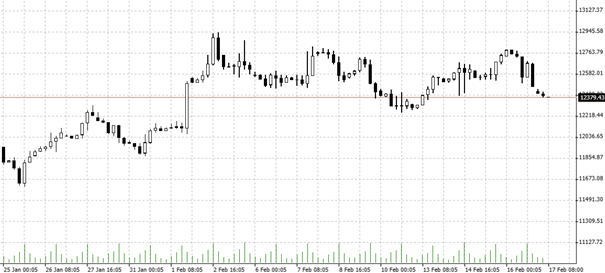

17.02.2023 – Wall Street is irritated: Producer prices are picking up – suggesting inflation is here to stay. And ultimately likely to lead to a buying strike and recession. And yet the Federal Reserve is signaling higher interest rates. After all, demand in the job market remains unabated: The number of new applications for unemployment benefits is falling slightly. Which speaks for a booming economy. How does all this fit together?
This is the recent reaction of the Nasdaq 100 to the latest developments, here the four-hour chart: irritation. For example, the Producer Price Index for Final Demand in the U.S. for January rose 0.7 percent, up from plus 0.4 percent that had been expected. Meanwhile, the head of the Cleveland Fed, Loretta Mester, spoke out and explained that she sees quite a further rate hike of 50 basis points.

Source: Bernstein Bank GmbH
In the University of South Florida Sarasota-Manatee, she justified this with inflation. The market read the statement this way: The odds of higher interest rates are now rising again after all.
A dove goes – a hawk comes
That’s because Mester is considered one of the toughest hawks around – and she’ll be moving up as a voting member at the Fed for Austan Goolsbee, who is taking over as vice chair. And that’s from Lael Brainard, who is going to the White House as head of the Council of Economic Advisers. The bottom line from this castling for traders and investors: with Brainard, a dove leaves and with Mester, a hawk moves up.
James “Jim” Bullard, President of the Federal Reserve Bank of St. Louis (non-voting) also reiterated calls for a 50 step. Especially since apparently the job market is showing no weakness. Thus just 194,00 new applications for unemployment benefits were reported, had been expected 200,000. No trace of a recession. Or is there?
Who is being counted?
We now fear a glaring false signal in the U.S., but also in the economies of the Western world. Yes, the official number of unemployed remains quite low – both in the U.S. and in Germany. But: We are registering many small self-employed and freelancers who are keeling over because customers are staying away. Especially since the Corona sanctions had already attacked the reserves of these entrepreneurs. Take a look around the impoverished city centers: Hairdressers, fashion stores, butchers, bakers, alternative practitioners are closing. The owners of these stores do not receive unemployment benefits. The construction industry is also preparing for a crash in the market because of the turnaround in interest rates. So if our thesis is correct, we are seeing a crisis in the job market that doesn’t completely show up in the numbers.
It’s all been done before
Veterans of the financial market will remember: Something like this has happened before elsewhere. Namely, in the Spanish real estate market. When Madrid was admitted to the euro zone and the consumptive peseta was replaced by the euro, interest rates slid downward. What followed was a building boom and a gigantic speculative bubble. Especially since the signals of a housing shortage did not abate – many people simply could not find a rental apartment. Ergo, there was probably too little housing. But the reason was often different. Often, property owners refused to rent out their empty apartments because of strict laws, preferring to wait for higher prices to sell them – landlords are virtually expropriated in Spain. Thus, the vacancy rate grew and what followed was the construction crash.
The conclusion from all this: We ask ourselves whether we are not facing a recession, which is still fueled by high interest rates. And we will continue to keep an eye on the situation for you!
__________________________________________________________________________________________
The content of this publication is for general information purposes only. In this context, it is neither an individual investment recommendation or advice nor an offer to purchase or sell securities or other financial products. The content in question and all the information contained therein do not in any way replace individual investor- or investment-oriented advice. No reliable forecast or indication for the future is possible with respect to any presentation or information on the present or past performance of the relevant underlying assets. All information and data presented in this publication are based on reliable sources. However, Bernstein Bank does not guarantee that the information and data contained in this publication is up-to-date, correct and complete. Securities traded on the financial markets are subject to price fluctuations. A contract for difference (CFD) is also a financial instrument with leverage effect. Against this backdrop, CFD trading involves a high risk up to the point of total loss and may not be suitable for all investors. Therefore, make sure that you have fully understood all the correlating risks. If necessary, ask for independent advice. CFDs are complex instruments and are associated with the high risk of losing money quickly because of the leverage effect. 68% of retail investor accounts lose money trading CFD with this provider. You should consider whether you understand how CFD work and whether you can afford to take the high risk of losing your money.7
